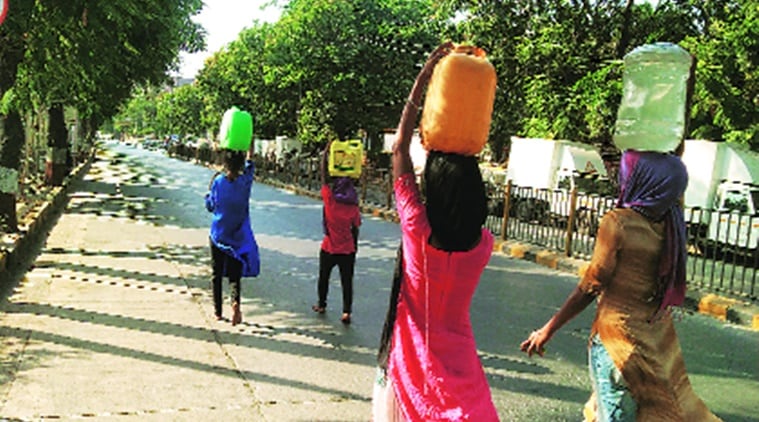 Pavement dwellers outside the Charni Road trudge with jerry cans after filling water from a nearby Bohri cemetery. (Express Photo)
Pavement dwellers outside the Charni Road trudge with jerry cans after filling water from a nearby Bohri cemetery. (Express Photo)
As seven-year-old Prem Rajput splashed water on his younger sibling Radhe from a bucket, Radha Rajput (65), his grandmother scolds him. “Don’t waste water. There isn’t enough for today,” she yells, drawing a scowl from Prem. As the boys reluctantly abandon their play, Rajput explains.
“We’re at the mercy of a good samaritan at a nearby Bohri cemetery. He allows us to fill one gallon of water a day. We have to make do with that,” she says. While water was always a scarce commodity for pavement dwellers like Rajput, the chawls, the hotels, and public gardens that they would rely on to meet their requirements have shut the gates on them following the imposition of the national lockdown.
“We would get our water from a residential chawl in the vicinity. But after the lockdown was declared, they have been refusing to let us in. Had it not been for the cemetery, we wouldn’t have water to drink,” says Rajput, whose family of garlanders has been staying on the pavement just outside the Charni Road railway station for over four decades. Prabhat Waghela, who stays in the nearby hut, remarks, “We fear that we may die of hunger and thirst before COVID-19 hits us.”
Just as authorities are advocating frequent washing of hands and keeping clean, Rajput says, “They say we mush wash our hands repeatedly, keep clean, and wash our clothes to prevent us from catching the infection. We’d really like to, but we do not have enough water to even drink.
“We can’t not drink water, but for other needs, we are cutting our use,” says Sona Rajput, her daughter.
Sitaram Shelar, convenor of Paani Hakk Samiti, an umbrella body of 26 organisations fighting for water rights for vulnerable groups, says: “Our study shows that vulnerability of the homeless and the slum communities, which lacked formal access to water, has grown following the lockdown. The informal sources that they relied on for their water needs have dried up. We are talking of 20 lakh people here. The government can’t afford to ignore their concerns.”
The Samiti has mapped 60 settlements across Mumbai whose residents are struggling to get water.
At another informal settlement near the Poisar gymkhana in Kandivali, the scene is no different. “The hotel that we would get most of our water from is shut. The nearby chawl has stopped entertaining us. Where do we go?” asks Lalita Shinde (30), who lives in a family of seven.
Her husband, Manohar, a daily wage worker, says he has been borrowing water somehow or the other, but it is nowhere near the requirement. “We needs 20 gallons daily. Nowadays, we barely manage five to six,” Lalita adds.
Raising a common cause of the 30 families residing on the pavement, Manohar questions the fees being collected for bathing and relieving oneself at public toilets. “They are still charging Rs 5 for using the toilet, Rs 10 for bathing, and Rs 15 for washing clothes. We haven’t earned a rupee since March 24. How can we afford it?”
Arjun Shinde, another local, says a charity did arrange for tanker water supplies for the community in the first few days, but it was discontinued.
At a pavement community in Mankhurd’s Maharashtra Nagar transit camp, Azma Shaikh (52) says that people have come up with desperate measures to tide over the crisis — some even digging holes outside their homes to access groundwater for washing clothes and utensils. Like the Charni Road pavement community, she says that the 160 families residing here too were mainly dependent on a low-income group housing society for daily water , but it has closed its doors. Some others are relying on a punctured civic water line for drinking supplies.
Shelar says the unprecedented shutdown has caught the city’s homeless in a bind. “On the one hand, the restrictions have meant that even their informal sources of water have dried up. On the other hand, the loss of daily wage has made buying water extremely difficult.”
Bilal Khan, an activist with the Ghar Bachao Ghar Banao, agrees. “The poor are being forced to buy water at very high rates. For 40 litres, they are being charged Rs 20,” he claims, adding that BMC the must urgently address the concerns.
“Water and shelter are fundamental rights of citizens. It is the government’s responsibility to make them available even to the homeless,” says Brijesh Arya, founder president of Pehchan.
The Samiti, meanwhile, has demanded issuance of temporary water connections to all such settlements where pipeline network exists. For other areas not served municipal water, it has sought free tanker supplies. While the Samiti has been writing to the authorities in this regard, it plans to move the Bombay High Court, which is at present hearing a petition regarding the rights of slum dwellers and the vulnerable sections in times of the lockdown.